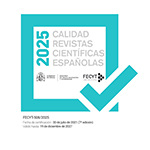Oblique participations and ethics of care: women artists and intellectuals at the Pavilion of the Spanish Republic in the 1937 Paris International Exhibition
Abstract
This article rethinks women's contributions to the Spanish pavilion in Paris in 1937 which was projected by Spain's Second Republic. The first part explores how their participation took place, often on the margins of officialdom, leaving a precarious trace in the archive. In it, we examine Manuela Ballester's role in the organisation of the exhibition, the women who worked in the bookshop (Marie Alonso, Carmen García Antón and Ramona Longás), and the possible interventions of artists such as Asunción Asarta and Margarita Sans-Jordi. The second part focuses on the works presented by Juana Francisca Rubio and Francis Bartolozzi, the only two women who participated in the exhibition out of a total of 98 artists. Both of them competed with works that center on practices of care, placing value on questions such as the importance of relationality, motherhood as a space for the emergence of the political, or the point of view of childhood. This article argues that Rubio and Bartolozzi transcend sexual difference to convert their "lateral" participation into a situated and political positioning that makes a forceful intervention in the narrative of the history of art of the period.
Downloads
Article download
License
In order to support the global exchange of knowledge, the journal Arte, Individuo y Sociedad is allowing unrestricted access to its content as from its publication in this electronic edition, and as such it is an open-access journal. The originals published in this journal are the property of the Complutense University of Madrid and any reproduction thereof in full or in part must cite the source. All content is distributed under a Creative Commons Attribution 4.0 use and distribution licence (CC BY 4.0). This circumstance must be expressly stated in these terms where necessary. You can view the summary and the complete legal text of the licence.










